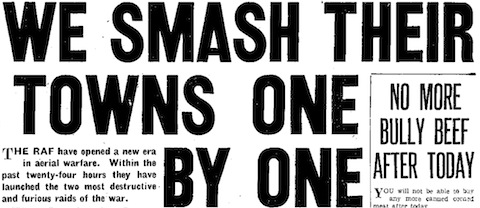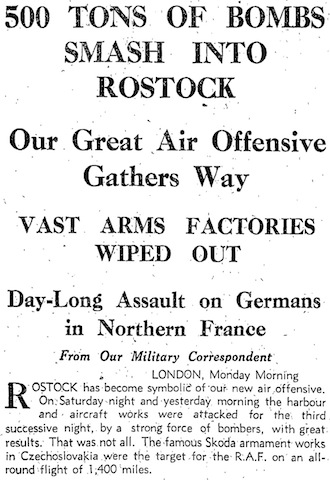
Most newspapers in my sample today lead with the further grim news from Burma (the Japanese army has now reached the suburbs of Lashio) but The Times chooses to go with the latest Bomber Command raids on Kiel and, for the second night running, Trondheim, both the locations of key German warships (4):
The heavier force was directed against the strongly defended naval base of Kiel, where the Scharnhorst is believed to still be in dock after her dash from Brest. The Tirpitz, Scheer, and Prinz Eugen are thought to be based on Trondheim, while a cruiser of the Hipper class has been in the locality, though she may not be there now.
These latter ships are ‘a definite threat to our communications with north Russia and in the Atlantic’. While ‘the Air Ministry makes no definite claim to have damaged the ships’, in the case of Trondheim stronger than usual explosions were heard on the Swedish frontier, which suggests ‘a bomb must have hit some explosive target; the explosion of even the biggest bomb could not in itself have caused such an effect’.

All of today’s papers do feature prominently a couple of RAF reconnaissance photos of Rostock. The one above of Rostock’s main railway station (6) appears to be that referred to in Tuesday’s papers), which was interpreted as showing crowds of people trying to get out of Rostock, marked above at 2 (at the station entrance) and 3 (on the platforms). Also visible, at 1 and 4, is damage to the station itself. Reports from Berlin say that around 100,000 people have been evacuated from Rostock, ‘virtually the whole pre-war population’ (Manchester Guardian, 5). A Swedish newspaper says that
the destruction is estimated at 70 per cent of all buildings. Many trains with homeless refugees have already reached Hamburg. After the raids German propaganda cars travelled round the town exhorting the people through loud-speakers to keep up their spirits.
As for Cologne, ‘None of the earlier raids […] compares with the latest British attack for the amount of destruction caused’.
The latest victim of what the Daily Express refers to as the Luftwaffe’s ‘Baedeker raids’ is an unnamed town in East Anglia (1). Last night, it was attacked by German bombers which ‘swooped so low that their markings could be seen in the moonlight’ and ‘dropped high explosives and incendiaries, wrecking workers’ homes and starting fires’. There was damage to churches and ‘some of the town’s historic buildings’, but it is believed that ‘the number killed may not be high’. York too has been bombed, by about twenty aircraft early yesterday morning. The Yorkshire Post naturally has the fullest coverage (though it is published in Leeds). Fortunately York Minster was ‘untouched’, but one unidentified ‘historic building’ was destroyed along with a church (1). Casualty figures are unknown at this stage, but a fireman was killed when a wall collapsed and the bodies two nuns were recovered from the ruins of a convent school this morning.
Most of the casualties occurred when houses were demolished in residential districts, and several working-class localities and rows of Council houses suffered very badly. To-day many of the citizens are homeless, their houses completely demolished and their belongings destroyed.
Commercial districts also suffered heavily, and the raiders machine-gunned an express train (luckily without killing anyone). The Yorkshire Post entitles its first leading article today ‘York Ravaged By Vandals’, though it is mostly a defence of British bombing policy (2):
Our policy is the only right and realistic one. It is true that the execution of it causes the destruction of a great many non-military buildings and brings death to a great many civilians. Night bombing is not accurate enough to pick out particular targets in crowded cities. It is true also that in total war there can be no precise definition of what is and what is not a military objective. As soon as a country’s total energies are devoted to war, any blow which weakens or diverts those energies, or puts a new burden upon them, may be considered to have military value.
But Hitler has chosen to ignore these ‘principles of air policy’. This seems to be a strategy born of weakness: the Luftwaffe appears not to have ‘immediately available the large bomber forces necessary for heavy raids on big industrial centres’. Instead he wants to inflict ‘obvious damage on residential towns, thus ensuring some lurid stories with which to satisfy an insistent reprisals demand from the German people’. But Hitler also seems to have some strange ideas about this country:
He may really believe that Britain has been forced reluctantly into the war by a clique of plutocrats, old-school-tie die-hards and Colonel Blimps, and that places like Bath and York are where these gentry live. By raiding their stately homes he may hope to frighten them into agreeing to some kind of pact which would rule out the night bombing of towns.
In the end, it doesn’t matter what the Germans do, for Britain will ‘remain sober and steadfast alike in our resistance and in our aims’:
Wherever and however they strike, they will find that the spirit of the British people is the same. At Bath […] it is the same as it was at Coventry. It is the same at York; the same front-line spirit rising up, cool and undaunted, in face of Nazi hate and Nazi savagery.
In similar vein, The Times urges that the RAF policy of attacking military objectives not be ‘deflected by the transparent tactics of terror’ currently being carried out by the Luftwaffe (5):
The only price too high to pay for safeguarding our visible historic heritage would be a betrayal of the cause to which the British people are committed. It would indeed be a betrayal if the British were for a moment tempted to moderate the onslaught of their Air Force upon the focal centres of German war production and transport in the vain hope of purchasing immunity for their cathedral cities. The anger and pain caused by these blows should not blind us to the spirit of methodical calculation in which the germans have decided upon this campaign.
Herbert Morrison, Minister of Home Security, has released a statement on ‘The Nazi crocodile tears over the destruction of certain old German buildings in British raids’, recalling ‘how those same Nazis openly boasted and gloated’ over the destruction of historic buildings during the Blitz (2):
In the raids of last year Nazi bombs destroyed the House of Commons, Guildhall, 19 historic churches in the City, the Temple Church and buildings, many of the famous old halls of the City Companies, Coventry Cathedral, lovely old churches in Bristol, Plymouth, and Southampton, and other splendid monuments of the past in all parts of the country.
Some solace from this sombre list may be taken from the suggestion made in the House of Commons yesterday by Sir William Jowitt, ‘charged with planning the [postwar] reconstruction’, that ‘Possibly many of the bombed areas in cities will be kept as permanent open spaces’ after the war: ‘Green belts to grow in bombed cities’ as the Daily Express puts it in its headline (3). However, no policy has been decided on yet.
Speaking of Parliament, the Express reports that the President of the Board of Trade, Hugh Dalton, ‘is astonished at the poor reception his fuel rationing scheme has received’ (1). He won’t drop it, but ‘he will modify it to the point where its reluctant father, Sir William Beveridge, will not recognise it’. The major change is that only solid fuel (i.e. coal, coke and anthracite) will go on ration. The Guardian‘s London correspondent suggests that Dalton is getting no support from the surprisingly non-committal War Cabinet, and is being left to fend for himself (4):
If he succeeds, well and good. On the other hand, if the opposition is as strong in the debate as it is to-day, then the Government will drop the plan.
I must sadly omit any discussion of the results of the Cripps mission to India (yet again), and the rumours noted in the Guardian of ‘three separate peace feelers’ from Germany (6) and of ‘a complete reversal of Italian policy, some of them even going so far as to prophesy the downfall of Mussolini and the accession to power of Marshal Badoglio’ (4). But I can’t resist quoting a proposal for large-scale climate engineering made in the Deutsche Volkswirst, reported by The Times (3). The idea is that
certain steps could be taken as a means of providing Europe with a more settled and reliable climate and an adequate and regular rainfall. The channel between Dover and Calais, it says, could be widened and deepened to admit a great volume of the warm Gulf Stream which at present banks up at the mouth of the Channel. A broad and deep channel could be cut between the North Sea and the Baltic so as to admit the Gulf Stream to the Baltic. The Gulf of Finland, Lake Ladoga, Lake Onega, and the White Sea could all be connected by a broad, deep bight so that the warm waters of the Gulf Stream should reach North Europe.
Furthermore, the northern end of the Caspian should be drained ‘thus recovering an area of arable land as large as Hungary’, and ‘The Urals, from farthest north to farthest south, should be reafforested as a bulwark against the Siberian climate’. The headline is ‘GERMANY COVETS THE GULF STREAM’.
![]() This work is licensed under a Creative Commons Attribution-NonCommercial-NoDerivatives 4.0 International License.
Permissions beyond the scope of this license may be available at http://airminded.org/copyright/.
This work is licensed under a Creative Commons Attribution-NonCommercial-NoDerivatives 4.0 International License.
Permissions beyond the scope of this license may be available at http://airminded.org/copyright/.






The “historic building” destroyed in York would have been the Guildhall which was rebuilt in the 60’s. The raid did a lot of damage, fortunately not concentrated. We moved up to York in ’48 and I can remember playing on some of the bomb sites.
There is a lot of detail on this raid, on the very many on Hull, plus lots of smaller incidents in “Air war over East Yorkshire in World War II” (Bright 2005) Err… I recommend this with a certain amount of trepidition, not having a nice thick thesis with which to protect my delicate parts.
Yes, I thought it was probably the Guildhall, I remember reading when I visited York that it had been destroyed by bombing. Thanks for the reference, I’d like to know more about Hull’s experience as it was bombed many times in both world wars, so it would be an interesting case study for, eg, how the memory of the first war influenced the preparations for the second. And don’t worry about needing a thesis for protection — it’s not necessary, as long as research is thorough and puddings are not over-egged.
Pingback: Airminded · Post-blogging the Baedeker Blitz: conclusion
Pingback: Airminded · Monday, 4 May 1942